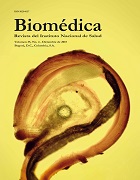Knowledge, attitudes and practices regarding malaria in the indigenous Guna population of the Madungandí region, Panamá, 2012
Abstract
Introduction: Knowledge, attitudes and practices surveys allow to determine the degree of knowledge on the management of malaria in a given population, as well as the attitudes and practices that contribute or not to its transmission.
Objective: To identify the knowledge, attitudes and practices that favor or not the transmission of malaria in the indigenous Guna population of Madungandí.
Materials and methods: A cross-sectional study was conducted by applying a survey to the heads of the families in a sample of 40% of households in three communities with high malaria incidence. Local Guna residents and translators were part of the research team that applied the questionnaires. The statistical analysis was performed in Epi-Info 6.04.
Results: The age range of those surveyed was between 20 and 70 years. All responders indicated that they belonged to and spoke the language of the Guna ethnic group, 64% were male and 30% were illiterate. Half (51%) of the responders declared they had suffered malaria at least once in the last eight years, and 89% accepted that malaria was a health problem. Sixty-three per cent responded that their traditional doctors, “inadule”, cured malaria and 7.0 % practiced the “pipe smoking” and “cocoa burn” rituals to prevent the disease.
Conclusion: Considering the limited knowledge about malaria and its vector, as well as the willingness to collaborate shown by the Guna population, it is essential to initiate educational and participative programs to improve control and prevention activities in the communities aimed at achieving a reduction in malaria incidence in the Madungandí indigenous region.
Downloads
Some similar items:
- Elizabeth Borrero, Gabriel Carrasquilla, Neal Alexander, Decentralization and health system reform: What is their impact on malaria incidence in Colombian municipalities? , Biomedica: Vol. 32 (2012): Suplemento 1, Malaria
- Iveth J. González, Metacaspases and their role in the life cycle of human protozoan parasites , Biomedica: Vol. 29 No. 3 (2009)
- Rosa Magdalena Uscátegui, Adriana M. Correa, Jaime Carmona-Fonseca, Changes in retinol, hemoglobin and ferritin concentrations in Colombian children with malaria , Biomedica: Vol. 29 No. 2 (2009)
- Ana María Vásquez, Felipe Sanín, Luis Gonzalo Álvarez, Alberto Tobón, Alexandra Ríos, Silvia Blair, Therapeutic efficacy of a regimen of artesunate-mefloquine-primaquine treatment for Plasmodium falciparum malaria and treatment effects on gametocytic development , Biomedica: Vol. 29 No. 2 (2009)
- Alberto Tobón, Danger signs in the malaria patient , Biomedica: Vol. 29 No. 2 (2009)
- Amanda Maestre, Jaime Carmona-Fonseca, Amanda Maestre, Alta frecuencia de mutaciones puntuales en pfcrt de Plasmodium falciparum y emergencia de nuevos haplotipos mutantes en Colombia , Biomedica: Vol. 28 No. 4 (2008)
- Nicolás Jaramillo, David Alonso Calle, Martha Lucía Quiñones, Holmes Francisco Erazo, Differentiation by geometric morphometrics among 11 Anopheles (Nyssorhynchus) in Colombia , Biomedica: Vol. 28 No. 3 (2008)
- Angélica Knudson, Rubén Santiago Nicholls, Ángela Patricia Guerra, Ricardo Sánchez, Clinical profiles of patients with uncomplicated Plasmodum falciparum malaria in northwestern Colombia , Biomedica: Vol. 27 No. 4 (2007)
- Paula Montoya, Alberto Tobón, Silvia Blair, Jaime Carmona, Amanda Maestre, Polymorphisms of the pfmdr1 gene in field samples of Plasmodium falciparum and their association with therapeutic response to antimalarial drugs and severe malaria in Colombia , Biomedica: Vol. 27 No. 2 (2007)
- Sandra Milena Barrera, Manuel Alberto Pérez, Angélica Knudson, Rubén Santiago Nicholls, Ángela Patricia Guerra, Genotypic survery of Plasmodium falciparum based on the msp1, msp2 and glurp genes by multiplex PCR , Biomedica: Vol. 30 No. 4 (2010)
| Article metrics | |
|---|---|
| Abstract views | |
| Galley vies | |
| PDF Views | |
| HTML views | |
| Other views | |


























